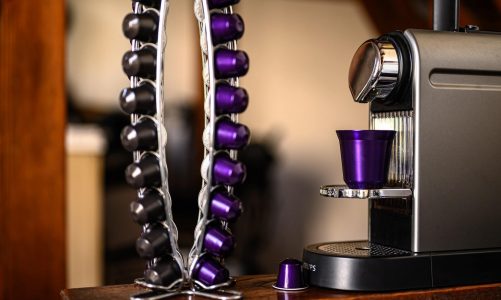Like many people, coffee drinkers are often searching for coffee and coffee-related products that add additional health benefits to their diets. Trends, such as adding MCT oils to coffee, can increase brain function and metabolism. Another recent diet development within coffee is “enzyme coffee”, which claims to help break down fats.
Despite this claim, there is a lot of uncertainty about what these enzymes are and their impact on weight loss. However, for drinkers looking to make coffee a larger part of their weight loss journey, enzyme coffee may be a great option.
You might also be interested in Mushroom Coffee.
What Is Enzyme Coffee?
Enzyme coffee, sometimes called “slimming coffee” and other names, includes a variety of coffee products that claim to support higher metabolism and weight loss through special digestive enzymes.
Surprisingly, enzyme coffee is essentially the same as any other coffee outside of the claim that it contains special metabolic enzymes. Enzymes are proteins that produce chemical reactions within the body.
There are many types of enzymes found in the body, and they can be found in a variety of plants and foods people often consume. Some digestive enzymes are produced directly in digestive organs, such as the pancreas. So, the basic difference is that enzyme coffee contains special enzymes linked to breaking down fats at higher levels.
While many producers of enzyme coffee do not name what the specific enzyme is, it is claimed to be a coenzyme for fat metabolism. What that means is vague and highly debatable. The most common enzymes that assist with metabolism and digestion are amylase, lipase, and protease. It is possible that the contents of enzyme coffees are derived from these digestive enzymes, but it is unclear.
Also, these enzymes naturally occur in the human body, so they would not be specific to these coffee products. Some products suggest that the enzymes in enzyme coffee are derived from certain B vitamins that boost metabolism. This is also a possibility, but again, these B vitamins can be found in a variety of other foods and supplements and would not make these coffee products particularly unique.
Traditional roasting methods often destroy certain enzymes found in coffee during processing due to the heat, chemicals, and equipment used. Companies that produce enzyme coffee have found ways to roast and process beans in a way that preserves these enzymes. Coffee marketed as enzyme coffee is often derived from green coffee beans that are closer to a raw bean than typical roasted coffee beans.
What Are the Benefits of Enzyme Coffee?

The main benefit of enzyme coffee is its claim to boost metabolism and weight loss. The enzymes in the coffee are supposed to increase the oxidization of fatty acids, increasing metabolism in drinkers. This inherently increases fat consumption and weight loss.
Outside of the benefits of digestive enzymes, coffee intrinsically has qualities that can increase weight loss. The caffeine in coffee raises energy levels, boosting metabolism. Higher energy also increases the likelihood that a person will have the energy and motivation to exercise throughout the day. Additionally, coffee has been shown to suppress appetites throughout the day and reduce the chance of overeating.
Coffee is also a diuretic, flushing excess water from the body. This helps with bloating and the retention of water weight. Coffee contains antioxidants and compounds that support immune health, improve brain function, and have been linked to lower levels of a variety of common diseases. The list of health benefits provided by coffee is extensive, so this may not be a comprehensive list.
The enzymes in enzyme coffee are not unique to the beans and can be found naturally in the human body and almost all plants or foods. If the enzymes in enzyme coffee are the same as naturally occurring ones in plants and bodies, there is nothing innately unique about the products. Some studies suggest that the enzymes are simply a form of B vitamins, such as B5.
So, drinking regular coffee and taking B vitamin supplements may produce the same results as coffee specifically marketed as enzyme coffee. Whether or not the enzymes in these coffees are helpful, it is important to remember that every person is unique and should do what is best for them.
If a coffee drinker tries an enzyme coffee and finds that it helps them lose weight and feel better, then it is fine for that person to keep enjoying that beverage.
Does Enzyme Coffee Have Any Negative Effects?

Generally speaking, there do not seem to be any negative effects to drinking an enzyme coffee. Since it is essentially the same as other coffee varieties, it is just as safe and beneficial for individual drinkers.
Depending on varying opinions, the only point of contention is whether or not enzyme coffee actually provides any metabolic benefits outside of those found in traditional coffee. Even if enzyme coffee is the same or similar to regular coffee, this means there is absolutely no physical harm in drinking it if an individual finds it beneficial.
The largest potential downside to these products is the likelihood that it is merely a marketing strategy, and that consumers would be wasting money by purchasing pricier enzyme products.
As with any other coffee beverages, the over-consumption of coffee and caffeine can potentially lead to an increased risk of anxiousness, sleeplessness, and other related conditions. Young and pregnant individuals are generally not recommended to consume caffeinated beverages.
Types of Enzyme Coffee
Enzyme coffee and other coffees marketed for weight loss come in a variety of forms and are produced by an assortment of companies. It can be difficult to distinguish what some of the products are and what makes them unique. One product that frequently appears online is It Works Skinny Brew, which is essentially a green coffee product that claims to stimulate weight loss.
One of the most popular and highest-rated products is VitaCup Slim Instant Coffee Packets. This product specifically lists ingredients like B vitamins and ginseng as stimulants to metabolism. Again, it is not totally clear what makes these products different from other products outside of additional vitamin content.
Is Enzyme Coffee Just a Hype?
Like most coffee products, there seems to be no danger or harm in trying coffees marketed as metabolism and weight loss stimulants. Coffee is a healthy beverage that can increase a variety of positive bodily functions, in addition to tasting great.
However, enzyme coffees and other weight loss coffees do not have much information to back up their claims, and the ingredients, enzymes, and vitamins they use are incredibly vague. If they do increase metabolism, it is likely that these benefits can be achieved with a normal coffee, a healthy diet, and vitamin supplement.
However, every individual responds to foods and beverages differently. If a person enjoys an enzyme coffee product and finds that it benefits them, it is perfectly fine to continue using the product.
There are also many other coffee products that can be incorporated into a healthy diet and weight loss journey. Popular Keto coffee products, such as Bulletproof coffee, use healthy fats and MCT oils to increase brain function and metabolism.
So, if a person does not like or trust enzyme coffee products, there are other options. Like all other coffee products, the most important thing for everyone is to use their judgment and taste preferences to find a product they enjoy.
The Final Sip
Whether you want to switch to enzyme coffee or just enjoy your regular brew, it’s all down to personal preference. Some companies just play on the hype of a health kick and really these are loosely based on health studies. It’s up to you as a coffee drinker to make your own mind up!





I am happy to have found your site, and I have a question that has prevented me from drinking coffee for many years. when I take a few sips of coffee, I instantly have a reaction of feeling disoriented and my cognition is greatly reduced. this happens regardless of the many coffees I’ve tried. It isn’t the caffeine, as I drink plenty of black tea etc. I used to love drinking coffee, and I’d like to drink it again. Please advise if you have any ideas, thanks, Lou